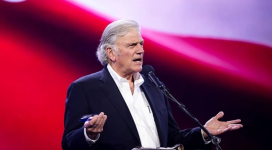The four-year case to lift religious disqualifiers in state-funded scholarships will re-open at Washington’s high court, Tuesday, Dec. 2. Experts believe that the court’s ruling, which will not likely come for months, holds enormous ramifications to similar prohibitions in as many as 36 other states.
The case began in 1999 when honor’s student Joshua Davey was denied the state scholarship initially offered to him, after he decided to attend a theological seminary. Davey, now a student at Harvard law, pitted himself against Washington state’s tough ban on using public money for religious purposes, arguing for the Constitution’s guarantee of freedom of religion.
"From my perspective it was very unfair and kind of arbitrary," said Davey, who sees the policy as disrespectful of the good he might have done society as a minister. "I was being told that that value wasn't important and wasn't worth the state's money."
"The government's decision not to fund the exercise of a fundamental right does not infringe that right," Solicitor General Narda Pierce wrote in the state's brief to the court. "Washington's decision not to subsidize religious instruction to implement its state constitutional policy of separation of church and state does not infringe Davey's right to seek a theology degree."
In 2000, Davey sued in federal court to overturn the policy, arguing that the rule violated his right under the U.S. Constitution to practice his religion freely. By 2002, the 9th U.S. Circuit Court of Appeals agreed, finding that the state had no compelling interest in limiting what Davey could study using the scholarship.
Supporters of Davey argued that the case was more about the ethics involved, rather than the $3,000 awarded by the scholarship.
"It's all about the principle," Davey said. "When you look at the cost of a four year college education, it's not that much money. I ended up taking out additional loans and working more outside of school than I had intended to do."
According to Jay Sekulow, the chief counsel to American Center for Law and Justice which took on Davey’s case since 1999, said that several issues are at stake.
"If we prevail, governmental programs that have a religious disqualifier would be suspect," said Sekulow. "You're not going to be able to target out religion or religious activities any more."
The court’s ruling will be a follow-up to last year's landmark opinion upholding school voucher programs. Also on tap, an appeal from the Bush administration over the phrase "under God" in the Pledge of Allegiance recited by school children. An appeals court ruled that it amounts to unconstitutional government promotion of religion.







